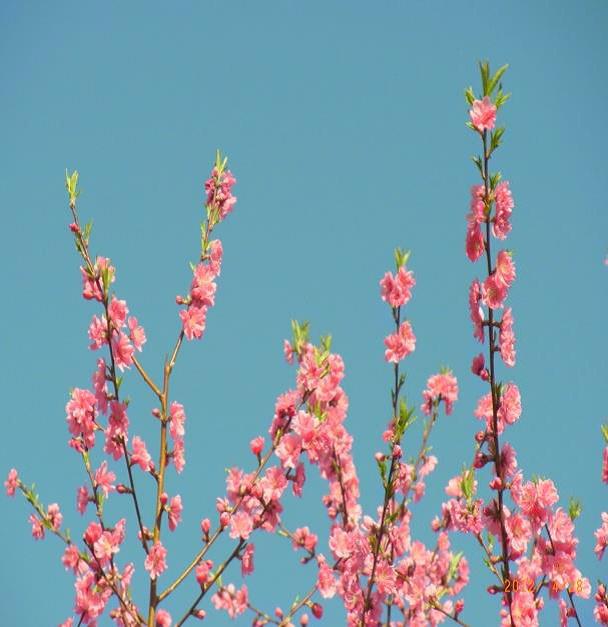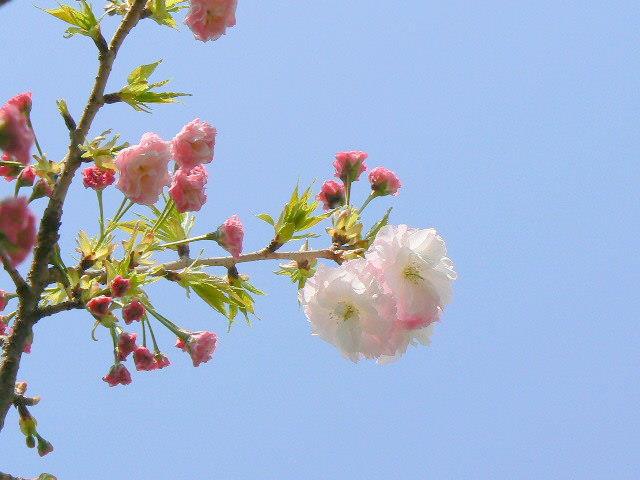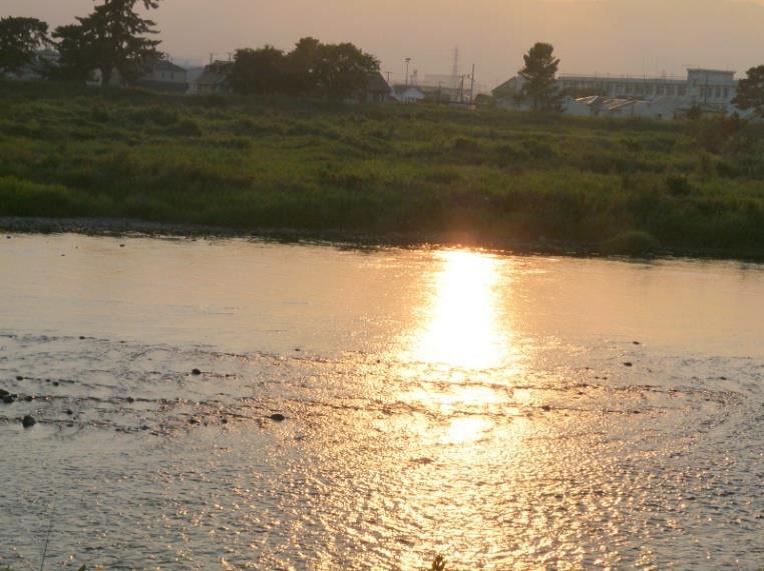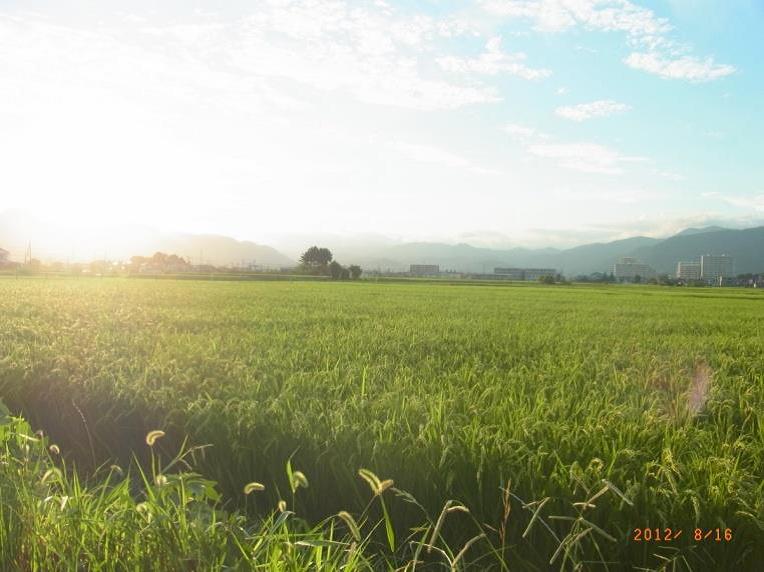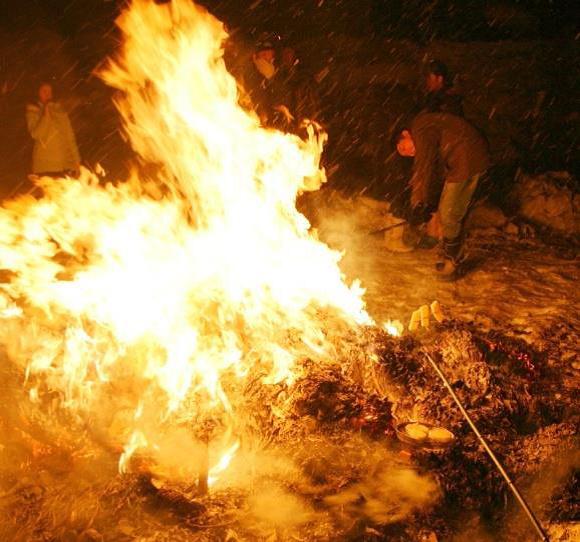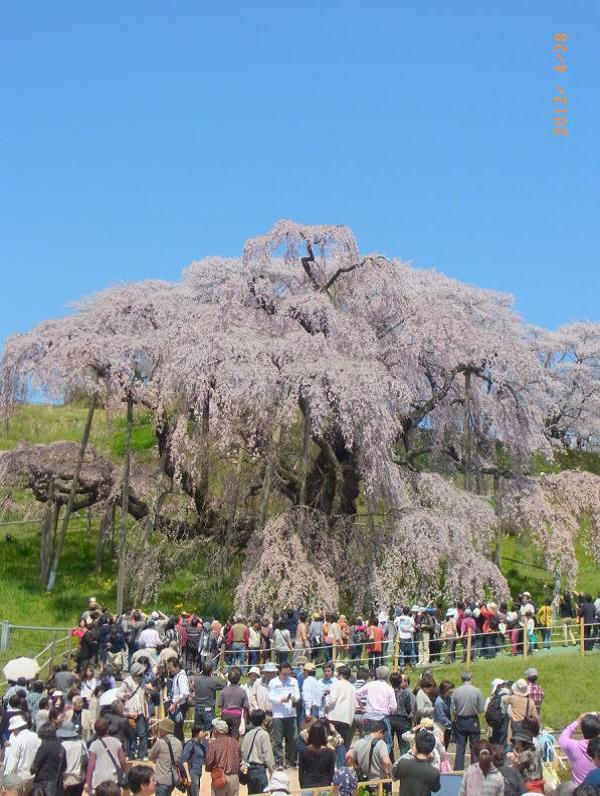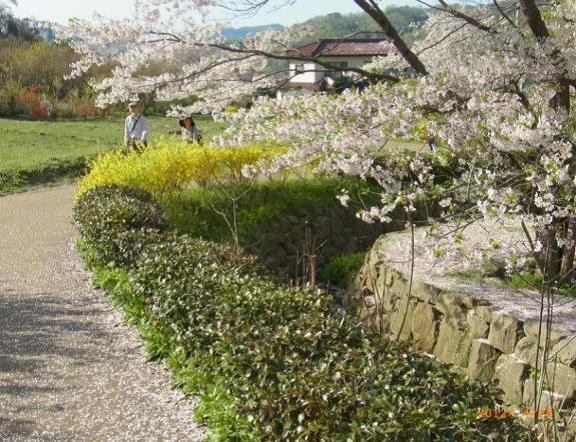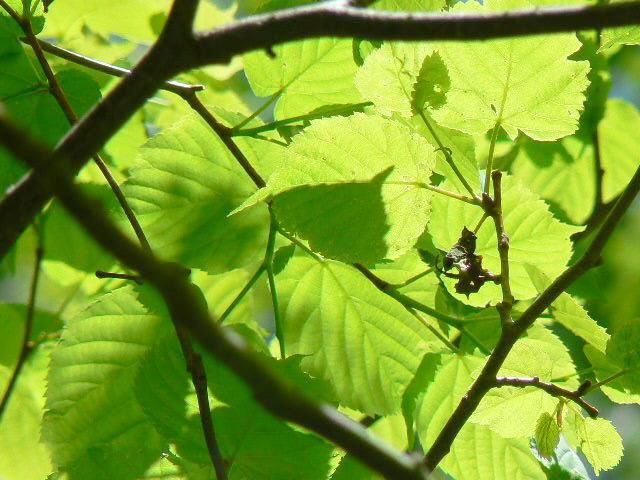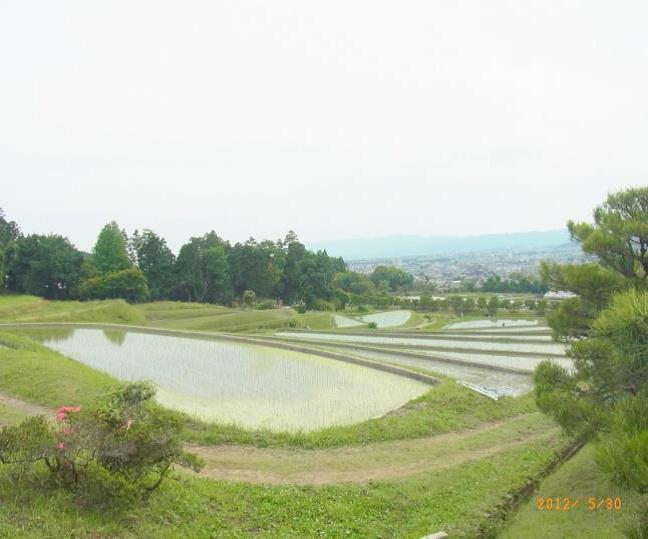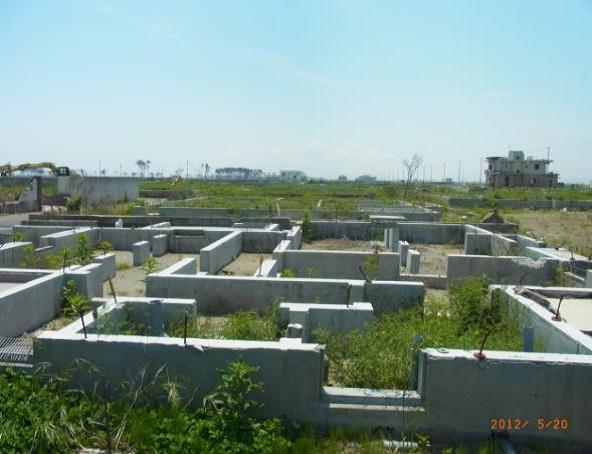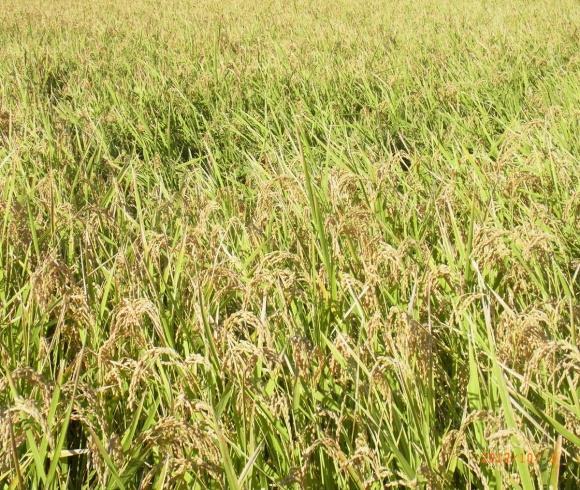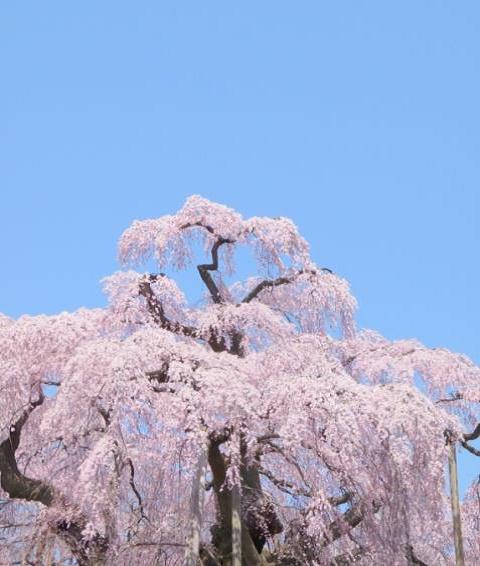
MyFukushima
Foreword
Taro Aizu is a Japanese poet and he invented the Gogyoshi. Besides Gogyoshi, he also writes Haiku and Haibun. All three can be enjoyed in “My Fukushima”.
His Gogyoshi are bare, to the point, poetic, stripped of ornaments. They show his keen eye to his surroundings. They catch the reader off guard and shake his world. His poems catch Taro's wonder andheshows his fears and joys to the reader in just a few words and one becomes afraid or joyous, for they are so close to the heart. One easily feels his love for his Fukushima, not so long agofull of life and light. But..the beautiful.Mother Nature showed her cruel side: An earthquake, a tsunami and..... the melt down of a nuclear plant.Life is no longer what it used to be:Children playing with dosimeters, green ricefields filledwith cesium, empty beaches, rain killing softly, hope for the gorgeous bloom of Takizakura:the old cherry tree.These are only but a few themes from Taro's jewels of poetry called Gogyoshi.
The cat
Ignorant
As it licks
Cesium rain
From its wet fur.
Don't we all get wet by the rains pouring down on us? Are we humans aware of the content of rain? Just imagine... and the horror is close at hand. 5-Lines make you aware.This istrue art!We'll sing a song
And dance again
Around the blossoms
in our hometown,
Fukushima, Fukushima.
This Gogyoshi rejoices, gives us hope for a better future. We all want to sing and dance again. Every cloud has a silver lining, but this is pure gold.
Scarecrows
In harvest rice fields...
The sunset.
It reminds me of Vincent Van Gogh's most famous painting which pictures crows flying over wheat fields.Art in words meets art in paint.Ed Hanssen
29 November, 2012
Nunhem, the Netherlands
Gogyoshi
THE RIVER
The rising river
Flows with violence
In thespring light
From melting snow,
The distantmountains.
BUDS
Such round
Pink peachbuds
More beautiful
Than the blossoms
In full bloom.
MAGNOLIA
After darkMagnolia blossomsHave just appeared
In the twilight
Like many white lamps.
A VIOLET
On a spring morning,
By the path,
An old couple
Looking down at a violet,
Chatting together.
A PETAL
A petal
From a cherry blossom
Floating down
Onto the back
Of my sleeping dog.
WATERFALL
The foaming
Waterfall’s crash
On the rocks
Stirring my heart
With violent sweetness.
SWEETFISH
Asweet fish
Jumpsout
Of the silent river
Colored by the sunset
Over distantmountains.
A FIREFLY
Palminga firefly
In my hands
Like a small cage,
I release it
Into the silent night.
THE COLLAR
Deserted,
The wide park,
I release my dog
From hiscollar
A summer dawn.
RICE FIELDS
The breeze blows
A transparent ripple
Through the green, green
Rice fields
In a summer evening.
FRAGRANT OLIVE
The autumn wind
Through our garden...
Small orange blossoms
Of fragrant olive
Scatter in my wife's hair.
THE FULL MOON
Looking upto
the full moon,
I imagine
Youalsolooking upto
the same one.
A SMALL BELL
This small bell
Made to keep bears away,
The only sound
Gentle to me
On the mountain path.
FESTIVAL
Shouting together
Shouldering a small shrine,
Adults march
their eyes twinkling
Like young boys.
GINKGO
Countless
Golden leaves
Of a ginkgo tree
Throw their last glow
Against the blue sky.
A FALLEN LEAF
“My present for you ! "
A little girl came running
And opened her palms -
Japanese maple :
A red fallen leaf.
THE FIRST SNOW
Waking up,
The first snow of winter
Makes the inside of my room
Colder,
Whiter.
MONKEYS
Wild monkeys
Soak themselves
In a hot spring
Closing their eyes
In the falling snow.
STARLIGHT
The colder
Air gets,
The clearer
Starlight
In an infiniteuniverse.
BONFIRE
While bonfireflames
Blaze in the night,
The falling snow
Melts onthe bangs
Of alittle girl.
THE SMELL
When my cat
Doesn’t come home,
I grill fish slowly
To make the smell float
Out the window.
A TEMPLE GARDEN
One hundred years,
Two hundred years,
The more time passes by
The more beautiful it gets
Atemple garden.
A SEED
Even though
Growing older,
I have a seed
To bloom someday
Deep in myheart.
TIME
I can neither see
Nor hear it,
But time
Flows through my body
Like blood
A NAP
My dog on the lawn,
My cat on the table
My wife on the sofa,
All taking a nap
Abeautiful Sunday.
Gogyoshi bunMy hometown, Fukushima
( 1)
Most Japanese people return to their hometowns to pray for their ancestors before their tombs every summer. This Buddhist tradition is called "Obon" in Japanese. Following the tradition, I went back to my hometown, Fukushima last summer,to pray for my late parents. But this time in 2011, I hesitated to return due to the contamination caused by the nuclear leak at the Fukushima Atomic Power Plant on March 11, 2011. The wind has spread cesium from the plant all across the prefecture. It’s said to be a cause of cancer for children and babies in the future. After hesitating for a few days, I decided to go back there in spite of this, for I believed I was too old to contract cancer from the fall-out. I went there by express bus in August. When I got off, the fields spread out as far as the eye could see.
I can't believe
They are contaminated
By cesium winds,
These green, green,
Rice fields.
( 2)I stayed at my brother's house and took a walk with my three nephews the next day. One of them said, "Oh, I’ve forgotten to take a dosimeter with me." He immediately went back home and brought it back with him. Children in Fukushima always hang dosimeters around their necks whenever they go out so that their teachers can check their radiation levels later. We walked to a park by a river. But there were no other children playing there except my nephews. Maybe the others were home playing computer games or watching TV to avoid the cesiumwind, for teachers advised them to stay at home and play indoors as much as possible.
The dosimeters
Hanging from their necks
Even when the children
Play tag with me
In the green park.
( 3)One afternoon it began to rain suddenly. Our catdashed into my brother's house from the rain and sat under the eaves.
The cat Ignorant As it licks Cesium rain From its wet fur.
( 4)Many residents living near the Plant fled after the leak. In particular, some young parents with children or babies sought safe shelter very far away from the area. But some old farmers near the plant, whether they were wealthy or not, did not wish to seek refuge elsewhere. They neither wanted to learn new dialects, new customs, nor leave their neighbors and friends.
Officials say
“ Flee from your village! ”
But the old men refuse
As they want to stay
In their hometown,Fukushima.
( 5 )One night when we watched a soccer game on TV together in the living room, I ate a pink peach. Though very delicious, a trace of
cesium must have just entered my body. I can’t see cesium, nor hear it, nor feel it. It’s an invisible enemy. However, honestly speaking, I’m not sure if the trace of cesium is my enemy or not. Some experts say it may be fine for our health as long as it's just a trace. Others say it is very dangerous. I don't know which is true. Strictly speaking, even experts haven’t discovered the truth. In the future,we'll be able to see what effect cesium will have, good or bad. But now I want to find out whether I will contract cancer or not. However, there is no way to know the future for sure. Only God can tell in the vast universe.
Cesium
Exists silently
Without any smell
Without any taste
In my dark cells.
( 6 )At late night, I talked of the radioactive contamination with my brother. What he told about a dairy farmer was a great shock to me. I examined the details by reading lots of articles about him in some magazines. The summary was as follows :
A dairy farmer lived in a small village near the Fukushima Plant with his Philippine wife and two sons. His family was happy as he kept about 40 cows and worked very hard with his wife every day. He built a new cow-shed to earn more money because his sons were still young. He prepared a new satchel for his elder son and expected that the entrance ceremony at the elementary school would be held in April when the cherry blossoms were in full bloom around the school ground. But suddenly the plant exploded after the huge tsunami on March 11.
The wind from there spread the cesium all over the fields, forests and rivers in his village. The cesium stuck to all the grass, trees and water without being seen, being heard or being smelled. After a while, the milk from his cows contained lots of cesium as they drank the water of contaminated rivers. He had to throw out all the milk every day. Because of concern for the health of his sons, he made his family evacuate from the village and go to The Philippines in April. It was before the entrance ceremony at the elementary school. The farmer remained by himself and kept working in the village for a while. Though he worked very hard, the level of the cesium was still high. At last he gave up milking the cows and joined his family in The Philippines in late April. However, he was able to understand neither English nor the Philippine language: Tagalog. He could not get a job there and returned to Japan alone in May. But he had neither cows nor his family in his village.
The dairy farmer
Left this message
“If the plant hadn't exploded,
I wouldn’t kill
myself.”
( 7)One day I went sightseeing to a famous tourist attraction by a large lake with my brother’s family, but there were few visitors due to concerns about cesium contamination. A bored-looking salesclerk was standing in front of the souvenirs shop. I approached him.
“Hey, looks like you have few visitors here.”
“Yeah ! Almost everyone’s keeping away because of cesium pollution. This is justdamage caused by rumor, isn’t it? “
“Well, I don’t know exactly whether low levels of cesium are alright or not. Even a small trace of cesium may cause babies and children to get cancer in the future.”
He knitted his brow, sullen, and said, “No, the government said it’s alright!”
I sat on the bench and began talking calmly.
“You are a nice guy, but you trust the government too much. Don’t trust its information blindly. You should protect your children. Some parents are avoiding Fukushima as they wantto protect their children.”
“Damn! If that’s true, what about our children in Fukushima? They eat vegetables containing a trace of cesium every day. Will they contract cancer in the future?”
I was silenced by his question.
“Hey, you’re a big city man! We,locals eat many foods containing a trace of cesium, vegetables, fish and meat here in Fukushima. As a result, children in Fukushima will take the worst of it!”
I was stressed by his serious words, but dared to answer.
“Yeah, that’s right! So we must find the best way to help all children including Fukushima’s. We must not sacrifice children in Fukushima at any cost.”
“Damn right!”
He looked happy but asked with a suspicious look. “Which side are you on, Fukushima’s or the big cities ?”
I turned my eyes toward the lake and spoke the Fukushima dialect quietly.
“Both. I was born in Fukushima and lived here for 18 years until I graduated from high school.
But now that I have lived in big cities for 30 years, I can understand both sides.”
He was surprised at my dialect and smiled at me.
“Alright, alright. We must not sacrifice our children in Fukushima. Absolutely not! But I don’t know how to stop it. I can only pray. ”
He looked toward at the big lake. The blue surface was brilliant, the breeze blowingoff of it was cool. Everything looked the same as any other summer. But there were no children swimming in the lake or shouting on the beach.
Give it back
give it back,
our former Fukushima
children once played outside
with their parents.
( 8)The salesclerk turned his eyes back from the lake to me and said, “It’s true praying is good, but it’s not enough just to pray for the future health of our children. If we have enough time to pray for them, we should help them practically, we should earn more money and give them food without cesium so that they don’t get cancer. It won’t matter if we eat something, we won’t live long enough to get cancer in the future.”
He burst into laughter, bending himself backward. I gave a bitter smile at his jokes and made my point once more.
“But you should give your children food with low levels of cesium, if you can.”
“OK! If I had to choose between two foods containing cesium, I’d give my children the food with less.
We parents have lived healthy lives for dozens of years, but our children are just starting out. They are still young. Besides, I can’t live a happy life if I’m always afraid of cesium every day. The rest of my life would be unhappy, wouldn’t it?”
He grinned ironically, but quickly turned serious. “We parents have only 20 or 30 years left to live, but our children have 70 or 80 years. Oh, my god...”
He was silent for a moment and said to himself quietly, “They will have unhappy lives being afraid of cancer since they will have to have cancer checks from childhood to their deaths. It will cause them some suffering every year. If they get cancer, they will suffer much more. I was given a healthy body by my parents and ancestors. But if my children get cancer because of cesium, I will have to apologize to all my ancestors.”
He gazed at the earth lit by the sunset for a while.
“Oh, no. You won’t have to apologize.”
He lifted his face and smiled at me.
“Thank you!”“No problem.” I smiled at him.
He looked again toward the brilliant surface of the lake.“I will grow vegetables without cesium for my children by any means.”
I politely responded, “I’m sorry, but I have to go home now. My relatives are waiting for me over there.”
I waved to them.
“Oh, I enjoyed chatting with you.”
“Me, too. See you here next summer!”
“Really? Next summer?”
“Yes, of course. I will return here to pray for my ancestors next summer. See you next Obon!”
The genetic heritage
not contaminated
by cesium
is a precious gift ??
my dark cell.
(9)After the explosions, many parents and public servants began to clean cesium from the grounds of all preschools, primary schools, and high schools. The residents
cleaned their gardens and even their trees. Farmers swept away the cesium from vegetable fields, rice fields and forests. Lots of inhabitants tried to clean all of Fukushima. But after that, fresh cesium just drained down to the fields in run-off from near-by mountains. They had to clean it again and again. In addition, the refugees didn’t know when they could return to their hometown or get new jobs in other towns. Lots of the nuclear disaster problems have not been solved yet. Nevertheless, many people from not only Japan but the world came to Fukushima as volunteers to help
evacuated people. A huge amount of donations, different medicine and even various artworks such as songs, pictures were sent from countries all over the world. The people in Fukushima were not alone but had bonds with the Globe. The kindnessesfrom the world were lights in their darkest despairs.
Rice and vegetables,Pears and peaches,
Cats and humans,May all beings
Revive in Fukushima.
(10)I made a habit of visiting Miharu near the nuclear plant to see the beautiful cherry blossoms every spring. The famous tree there was about 1,000 years old. It was not a regular tree but a large cherry. The residents
call it "Takizakura". "Taki" means waterfall and "zakura" cherry blossoms in Japanese.
The blossoms look like pink waterfalls cascading from the blue sky, streaming gently in the warm breezes of spring. The blooms are not only gorgeous but look fresh against the blue sky. Looking up at them, my friends and I snack on Japanese cakes, and beer, then take a nap for afew hours. This was my custom every spring.
But I didn't visit Miharu this spring. I was very worried about the cesium there. The explosion last March stopped me from going there in April.
However, I will go there again. I’ll return to Miharu next April to be revitalized by the cherry blossoms. I'll have my yearly date with Takizakura as usual. To be sure, the nuclear disaster problems have not been solved yet. It may take dozens or hundreds of
years to solve them completely. But Takizakura will be living a healthy life with the residents as a symbol of restoration during this long span. If we look after it carefully, it will live for 1,000 years.And Takizakura will bloom gorgeous and fresh against the blue sky every spring even after the radioactive contamination is solved completely. Of course, we’ll be dead 1,000 years later. But then our descendants will be able to see them in full bloom.We'll sing a song
And dance again
Around the blossoms
In our hometown,
Fukushima, Fukushima.
Haiku and Haibun
At last, I visited Miharu to see the Takizakura in April, 2012. It was asbeautiful as always. I stayed looking up at it for two hours.One thousand years
Flow through the blossoms…
Takizakura.
I went to Fukushima city after Miharu the next day. There were lots of cherry blossoms in full bloom. But then they began to fall.
One by one
One by one…
Cherry blossoms
I sometimes take a walk in nearby forests.
Morning sunlight…
Through ayoung leaf
In the forest.
Fukushima has some nice beaches near the nuclear plant but now there is no one there.
As if the tsunami
Had been a fabrication…
A calm sea in spring.
There are lotsof terraced rice fields on theslopes of mountains in Fukushima. Farmers plant rice seedlings there from late spring to early summer. After that, green seedlings wave on the water in the breeze.
Late spring…
The sound of fallingwater
On the terraced rice fields.
I went to Sendai near Fukushima in May. It was hit by a huge tsunami last year. A small town was washed away except for a few houses and a primary school.
Summer grass…
Only house foundations
Remain in silence.
In the empty town, swept away by the tsunami, I was able to see many black objects fallen over and went up to them.Black tombstones
Fallen in the graveyard…
Summer light.
At the end of July, I visited Minamisoma near from Fukushima nuclear plant to see the horse festival called, “ Somanomaoi ”. It has the tradition for about one thousand years. I entered the stadium in the city.Clouds of sand,
Neighing of horses…
Summer has come to Minamisoma!
I invited my relatives’ children from Fukushima toYugawara beach during their summer vacations. They can’t swim in the sea by Fukushima because of cesium pollution.Children
From Fukushima
Dash into a white surf.
This summer I visited Tokyo and joined a demonstration against nuclear power plants in front of the prime minister’s residence for two hours. There were bothmen and women, the young and the old, Japanese and foreigners, all kinds of religionthere.Humid night …
“ No nuclear plants ! ”
I shout, I shout.
There are lotus in the rice fields near my house. I go to see the flowers every summer.The silent dawn…
A thin petal of
The lotus flower.
Rice in Fukushima contained a trace of cesium last year. Farmers have been cleaning it away in the rice fields for one year.May notcesium
Becontainedin the new rice
Any more.The word “scarecrow” is a kigo (meaning aseason word in Japanese) of autumn.
Scarecrows
In harvest rice fields...
The sunset.The typhoon passed my house last night. I cleaned many fallen leaves in the garden.
Bowed by the storm
cosmos bloomingagain ?
this dewy morning.
An elementary school in a village near the plants has held a sport festival for the first time since the nuclear disaster. The cesium has gotten less and less.
Children
Rush across the finish line…
A sport festival.
Last year the rice from Fukushima contained lots of cesium. Officials have checked the rice in Fukushima more strictly than last year.At last
Less cesium
In the new rice.
All residents living near the nuclear plant evacuated from their towns, leaving their houses broken by the earthquake and thetsunami.The snow blowing
Into the living room broken …
The earthquake and tsunami.
The small blizzard
Soaring high, drifting about…
The morning blue sky.
The dairy farmers fled away from their houses, leaving their cows loose in the fields.
The falling snow…
Black cows wandering
Near the plant.
We can imagine it in the midwinter.Groundwater
Climbs into the dead trunk…
The silence in winter.
Japanese daffodils
Always bloom in midwinter….
Quietenergy.
The mother with young children fled far away from the nuclear plants to another prefecture. But her husband still stays in his town in Fukushima, working there for his family’s sake. He can’t find a job in the prefecture where his familylives. He goes there to see his wife and children once a month.May the father
Live with his family
In Fukushima.
Thegrandfatherlived with hischildren and grandchildren in the same house in Fukushima after the explosion. He grew good vegetables for hisfamily in the garden but hisgrandchildren never ate them as they contained a trace of cesium. Now they eat only vegetables from other prefectures which their mother buys at supermarkets.May a grandfather
Share hisvegetables
With grandchildren
Children inFukushima are not experimentalsubjects. They are treasures of the world.
May children in Fukushima
Have no cancer
In the future.
They say Takizakura is about 1,000 years old.
May Takizakura
Livea longer life
With Fukushima.
There are lots of nuclear plants not only in Japan but aroundthe world.
May no living thing
Be extinguished by nuclear plants
Acrossthe Globe !
May my prayer to the universe
Give me the power
To abolish allnuclear plants !
Afterword
I was born in the Aizu region of Fukushimaprefecture and passed 18 years there, but now I live in Kanagawa prefecture. The Fukushima nuclear plant exploded on March 11, 2011, after a powerful earthquake and the resultant tsunami. Last summer I went to my hometown, Fukushima, for the first time since the disaster. Then I happened to see my nephews hanging dosimeters around their necks. The scene gave me a great shock. It made me consider the explosion of the plant, and after that I wrote “My hometown, Fukushima” in Japanese last autumn. Moreover, I translated it into English and French this spring and wrote haiku this summer and autumn.
As for gogyoshi, I had written most of them two years before, while thinking of my hometown. Now “My hometown,Fukushima ” has been translated into 18 languages by my Facebook friends.
Besides, many artists inspired by “My hometown, Fukushima ” held an exhibition for my gogyoshi and their artworks in Netherlands from November 17 to 25, 2012.
Lots of English native-speakers helped me with the English versions. Special thanks to Brian Zimmer, Mervyn Edwards, Janice Thomson,and Ed Bremson, my English has becomemuch better! I wish to express my sincere thanks for their cooperation in this edition.
Taro Aizu
December 1, 2012
Hadano, Japan
First editionirst
Copyright. December, 2012 by Taro Aizu.
All rights reserved.
All photos were taken by Taro Aizu, and Hideaki Nagamine. Most of them in Fukushima, and some in other areas of Japan.
The cover picture was painted by Gonny Geurts in Netherlands when they held “Gogyoshi Art Project” at Lelystad in Holland, on November 17 to 25, 2012.
anshin©2011All rights reserved. When using the materials of the site, reference is obligatory.
Proposals for co-operation, as well as comments and suggestions on the site please send to the address: anshin-sad@mail.rutel: +7 (965) 121-80-60, 10am-20pm

